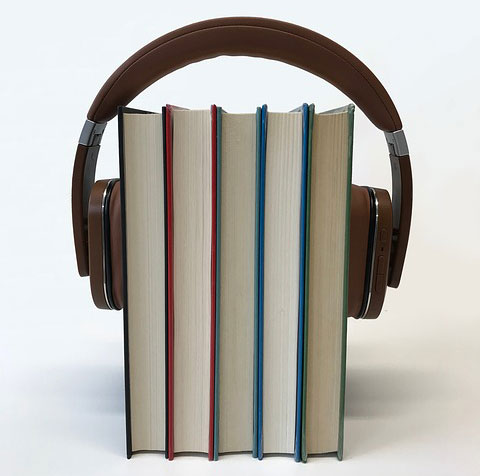(This post was updated on January 19, 2021)
Over the past few years, I’ve been increasingly addicted to audiobooks. Most book publishers offer an accompanying audio version, and the explosion of third-party services make it easier and easier to download a book to any portable device. (Though Audible is the most obvious subscription choice, you can support your local independent bookstore by joining libro.fm.) Thanks to Overdrive, you can even check audiobooks out of the library.

With all of this increased portability and decreased file size, we can now take our books along with us: on walks, flights, or in the car—even on the boat. (Eventually, digital assistants will be able to read us a book in voices realistic enough to be tolerable, but we’re not there yet.)
As an Author/Narrator
I’ve already produced audiobooks for Ferry to Cooperation Island, Oliver’s Surprise, and Cape Cod Surprise, and I’m in the process of recording Game of Sails. There are almost as many ways to develop an audiobook as there are ways to download the finished version; in addition to the usual publishing dos and donts, there are several new pitfalls to avoid. Thanks to an in-house recording studio and access to great equipment, I’m able to record my own books—which always teaches me something about their writing. And while it’s quite a substantial time investment, I don’t have to pay someone else to read my books.
As a Reader
What fascinates me as a consumer of audiobooks is how differently I absorb with my ears than I do with my eyes. When I’m “just” listening, my mind tends to wander—unless my hands or feet are also accomplishing another goal. (I must admit, this is true of many conversations as well. Sorry Paul.) That makes audiobooks a great accompaniment for another activity, but not a great fit for bedtime reading—they put me to sleep.
Reading with my eyeballs requires full concentration. I don’t even do a good job of tuning out background noise.
Reading with my ears, I’ve been able to expand my consumption of non-fiction. Memoirs and books on writing that might otherwise languish in my bedside TBR pile edu-tain me while I’m doing something else during the day. It doesn’t reduce my appetite for the fiction I consume at bedtime; it’s a way to add more reading time to my usual day.
Reading or Listening?
One question that doesn’t seem to have a good answer is whether it is possible to “read” audiobooks, or if the only proper verb is “listen to.” Got an opinion, or a favorite type of audiobook? Leave a comment below, or send me an email. Thanks for reading!
Nice blurb. Audiobooks has got me back into reading more by leveraging the 40 minute commute to work each day. I admit that the “hang time” of remembering the details is lower but for me, it is all about finding ways to dig into other worlds in whatever way I can, even if it means probably not being able to pass a test if I were to be given one on the subject matter. I’ve read light stuff (Bill Bryson’s walk around Australia), pertinent to sailing stuff (Slocum’s Sailing alone Around the World), heavy stuff (a class on Aristotle, Plato and Socrates) and thrillers (The Girl with a dragon Tatoo). Unfortunately, the lecturer of the philosophers book is a big time down-talker so I often miss the last word or few syllables in his sentences which is a bummer. This is the first book that I had this experience with. I’m looking forward to “reading” one of your Oliver series books.
I too am experimenting with format/heaviness. For the drive to Miami it was light-ish novel fare. I only missed one key turn. 🙂 Thanks for your thoughts!